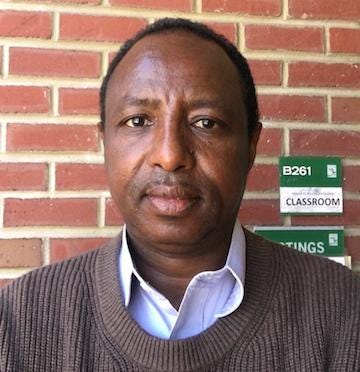by Alison Stapp

On July 17, 1989, over 50 Isaaq clan businessmen, students and intellectuals were ripped from their homes in Mogadishu, Somalia, tortured, taken to Jaziira Beach, summarily executed, and thrown into a shallow grave. A lone survivor, Omar Isse Mire, dug through his shield of dead bodies and ran back to town to describe the horrific night.
Stories from the survivors of atrocities against the Isaaq clan were shared through the efforts of Laney student Suleiman Ismail Bolaleh, who dared to be a “voice for the voiceless.”
Somalia’s dictator, Mohamed Siad Barre, specifically targeted Isaaq clan civilians. Approximately 200,000 Isaaq clan members were murdered before the collapse of his regime — from 1969 to 1991 — and 226 mass graves have been uncovered, according to the Somaliland Times.
Bolaleh, a member of the Isaaq clan, graduated from Somali National University with a Bachelor of Arts in history and geography. During the massacre, he was safe with his girlfriend because she belonged to the tribe of President Barre.
His escape compelled him to speak out about human rights abuses that were occurring on the Horn of Africa, despite the dangers of doing so. “People trusted me with their stories because I spoke the same language,” he said.
Bolaleh has been an advocate for human rights since his escape from the Jaziira Beach Massacre, nearly 30 years ago. He reported on the abuses people suffered during Barre’s regime. He said people were willing to share their stories with him because it was the first time someone had taken an interest in bringing them justice. “The people I interviewed had stories that would never have been told,” he said. “Despite threats, imprisonment, and torture, people came to me.”
In early 1990, Suleiman, 23, was invited by Amnesty International to a two-day underground intensive training in Djibouti. He learned about reporting, techniques for interviewing victims, and other journalistic skills that would later enable him to become part of an international network of human rights advocates.
In 1994, Bolaleh co-founded an organization called Horn of Africa Human Rights Watch Committee (HORNWATCH). It secured worldwide attention when Mona Rishwami, the U.N.’s first independent human rights expert, mentioned HORNWATCH in her 1998 report to the U.N. Security and Social Council exposing corruption and abuses of Somalia’s government.
Through his work with HORNWATCH, Bolaleh established personal relationships with many victims. His work helped the Center for Justice and Accountability (CJA), a U.S. organization of legal workers, build a case on their behalf. The CJA led the investigation that brought charges against General Samantar, one of Barre’s henchmen, in 2012.
“The case sought redress for victims and witnesses who had been tortured and killed, forced from their homes or disappeared, just because of their clan,” Bolaleh said.
For 18 years, Samantar was living comfortably in Fairfax, Va. In a landmark decision, the CJA won a $21 million lawsuit against him. The CJA, with Bolaleh’s help, won a ruling that perpetrators of crimes against humanity would not be protected with impunity. Neither the U.S. State Department nor the Somali Federal Government sought impunity, and U.S. courts denied Samantar’s final appeal.
Bolaleh received HORNWATCH’s human rights award in 2013 after condemning the assassination of one of the most beloved Islamic scholars in Hargeisa, Sheikh Abdiqadire Nur Farah.
In 2015, he received the Judith Lee Stronach Human Rights Award from the CJA in San Francisco. When he accepted his award, Bolaleh said it may be hard to imagine “countries where there are few protections for human rights defenders, and the rule of law garners no respect.” He spoke of the value of his partnership with CJA, whom he described as an organization of “dedicated lawyers who risk their lives.”
In 2015 Bolaleh moved to Oakland. On Jan. 9, 2018 he was granted political asylum. Two weeks later he enrolled as an ESOL student at Laney College. He continues his work in eastern Africa, and believes English proficiency, along with his determination, will help him reach as many people as possible.
He is working on starting a new organization, to be called “Guardians of Civil Liberty in the Horn of Africa,” in order to continue giving voice to the people in his homeland.
Alison Stapp is a staff writer at the Laney Tower.

























